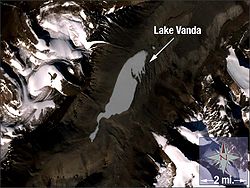Lake Vanda
| Lake Vanda | |
|---|---|

Landsat 7 image
|
|
| Location | Wright Valley, Victoria Land, Antarctica |
| Coordinates | 77°31′47″S 161°34′32″E / 77.52963°S 161.57553°ECoordinates: 77°31′47″S 161°34′32″E / 77.52963°S 161.57553°E |
| Lake type | Hypersaline lake |
| Primary inflows |
Onyx River Bartley Stream Clark Stream Meserve Stream |
| Primary outflows | none |
| Basin countries | (Antarctica) |
| Max. length | 8 km (5.0 mi) |
| Max. width | 2 km (1.2 mi) |
| Surface area | 5.2 km2 (2.0 sq mi) |
| Average depth | 30.8 m (101 ft) |
| Max. depth | 75 m (246 ft) |
| Water volume | 160 million cubic metres (130,000 acre·ft) |
| Surface elevation | 143 metres (469 ft) |
| Settlements |
Vanda Station Lake Vanda Hut |
Lake Vanda is a lake in Wright Valley, Victoria Land, Ross Dependency, Antarctica. The lake is 5 km long and has a maximum depth of 69 m. On its shore, New Zealand maintained Vanda Station from 1968 to 1995. Lake Vanda is a hypersaline lake with a salinity more than ten times that of seawater, more than the salinity of the Dead Sea, and perhaps even more than of Lake Assal (Djibouti), which is the world's most saline lake outside of Antarctica. Lake Vanda is also meromictic, which means that the deeper waters of the lake don't mix with the shallower waters. There are three distinct layers of water ranging in temperature from 23 °C (73 °F) on the bottom to the middle layer of 7 °C (45 °F) and the upper layer ranges from 4–6 °C (39–43 °F). It is only one of the many saline lakes in the ice-free valleys of the Transantarctic Mountains. The longest river of Antarctica, Onyx River, flows West, inland, into Lake Vanda. There is a meteorological station at the mouth of the river.
The lake is covered by a transparent ice sheet 3.5–4 metres (11–13 ft) year-round, though melting in late December forms a moat out to approximately 50 metres (160 ft) from the shore. The surface of the ice is not covered with snow and is "deeply rutted with cracks and melt lines". During the colder months the moat refreezes.
While no species of fish live in Lake Vanda or the Onyx River, microscopic life such as cyanobacteria algal blooms have been recorded. Due to the concerns over impact to the natural environment that may occur during research, scientific diving operations are limited to work in the upper layer (above 30 metres (98 ft)) and remotely operated underwater vehicle use is not allowed.
...
Wikipedia
